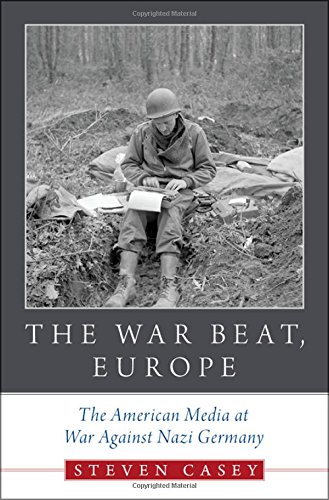Product desciption
The War Beat Europe The American Media At War Against Nazi Germany 1st Edition Casey by Casey, Steven 9780190660628, 9780190660635, 0190660627, 0190660635 instant download after payment.
"Broadcasting pioneers like Ed Murrow and Walter Cronkite, unpretentious reporters like Ernie Pyle, and dashing photographers like Robert Capa and Margaret Bourke-White are remembered for their courage and their willingness to put their lives on the line to record the sights and sounds of the World War II battlefield. In return for their fervent loyalty to the anti-Nazi cause, so the argument goes, the military provided them with almost unprecedented access to all the major events. Small wonder that they apparently responded with patriotic generosity, telling a story that both the military and the home front wanted to hear: World War II as a great American success story. In doing so, these war correspondents engaged in self-censorship to hold back the type of story that would have a corrosive impact on domestic morale. Casey uses relevant archives of primary sources that other previous works have failed to, to challenge the core assumptions at the heart of the WWII media narrative. Was the American public exposed to an upbeat and anodyne image of the 'good war,' which helped to ensure that domestic support remained durable and robust? How did the military's goal of keeping civilians 'entertained,' the president's aim to prevent complacency on the home front, the media's desire to sell papers and radio shows, and the reporters' ambitions and hardships affect what Americans read about the war in the European theater? Was the cooperation between the military and war correspondents voluntary, altered by censorship policies, coerced to some degree, or the result of a fractious compromise? Steven Casey gives the real scoop in this in-depth account covering the reporters who covered the European beat from the battlegrounds of North Africa, Germany, Italy, and France"--
Abstract: "Broadcasting pioneers like Ed Murrow and Walter Cronkite, unpretentious reporters like Ernie Pyle, and dashing photographers like Robert Capa and Margaret Bourke-White are remembered for their courage and their willingness to put their lives on the line to record the sights and sounds of the World War II battlefield. In return for their fervent loyalty to the anti-Nazi cause, so the argument goes, the military provided them with almost unprecedented access to all the major events. Small wonder that they apparently responded with patriotic generosity, telling a story that both the military and the home front wanted to hear: World War II as a great American success story. In doing so, these war correspondents engaged in self-censorship to hold back the type of story that would have a corrosive impact on domestic morale. Casey uses relevant archives of primary sources that other previous works have failed to, to challenge the core assumptions at the heart of the WWII media narrative. Was the American public exposed to an upbeat and anodyne image of the 'good war,' which helped to ensure that domestic support remained durable and robust? How did the military's goal of keeping civilians 'entertained,' the president's aim to prevent complacency on the home front, the media's desire to sell papers and radio shows, and the reporters' ambitions and hardships affect what Americans read about the war in the European theater? Was the cooperation between the military and war correspondents voluntary, altered by censorship policies, coerced to some degree, or the result of a fractious compromise? Steven Casey gives the real scoop in this in-depth account covering the reporters who covered the European beat from the battlegrounds of North Africa, Germany, Italy, and France"


